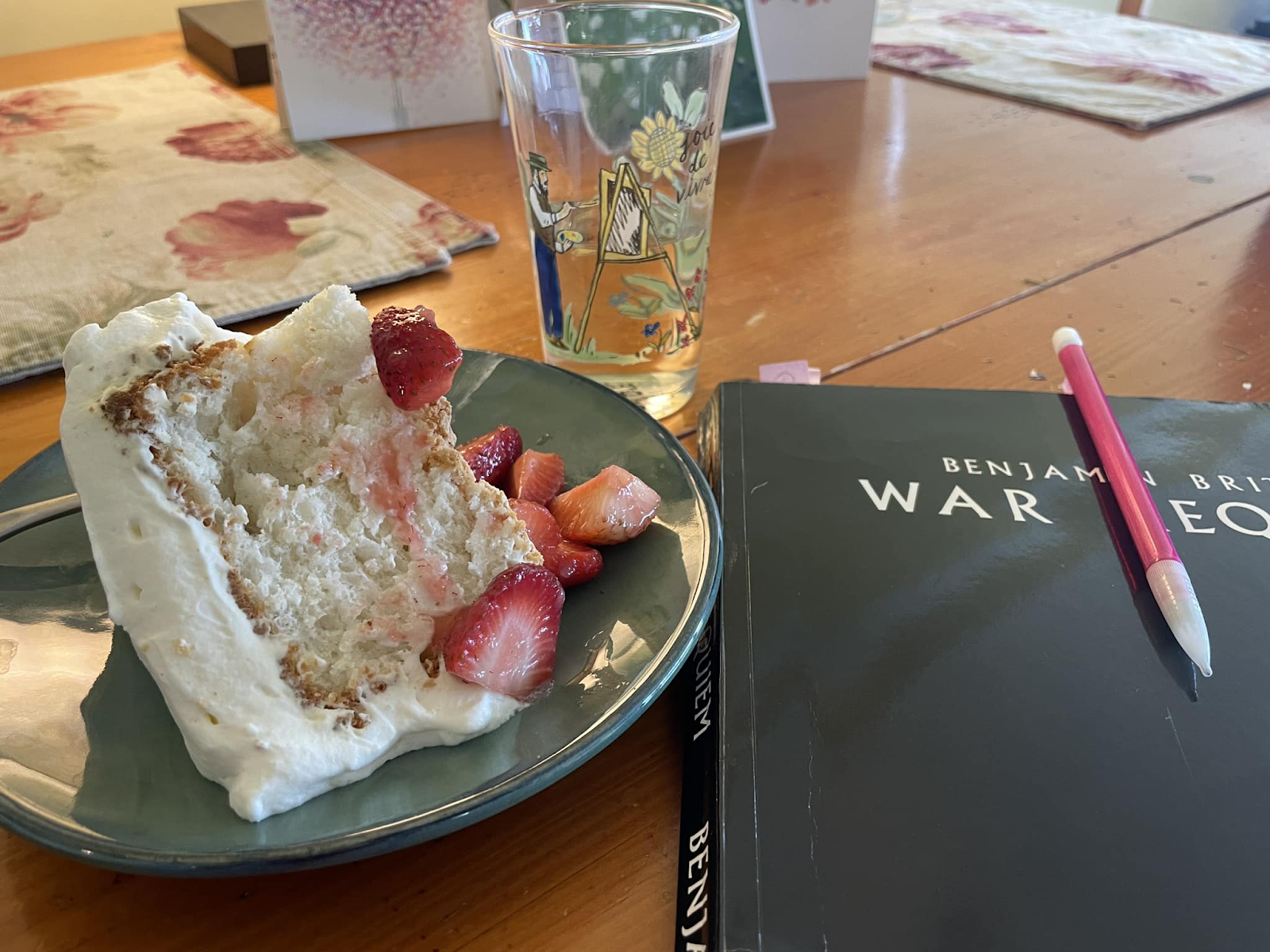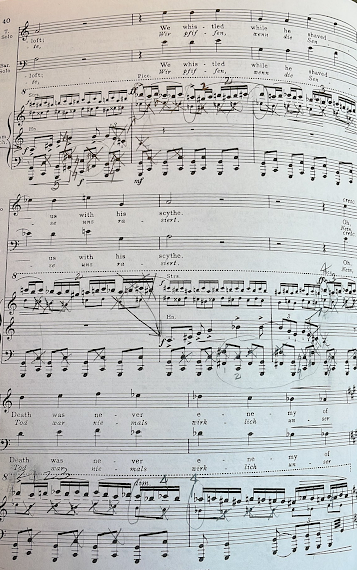I'm sitting here in my home, doing the only thing I can do at the moment - eating a piece of cake accompanied by a glass of white wine at 4pm in the afternoon.
I think it's called for.
Every so often I'm called upon by our local opera company, Opera Roanoke, to serve as their rehearsal pianist. I think this is one of those invisible music roles that most people, even many pianists, don't realize even exist. Perhaps that's because it's a role that can literally just last a couple of hours. Or perhaps it's because there simply aren't a lot of us out there willing to do this kind of work.
In my opinion it's an example of extreme musicking and it's one that I have a bit of a love-hate relationship with. The work is daunting much of the time, requiring a lot of time to prepare, the experience involves combination of humility and bravery, and often the job doesn't include a performance in front of an audience. On the flip side, I get to work with a brilliant conductor, Steven White, and amazing soloists (who are sitting only feet away from me I might add!) I also inevitably end up having my mind changed about more challenging monumental works (shout-out here to Bartók's Bluebeard's Castle and this most recent venture, Britten's War Requiem.) I love being proven wrong about music. It helps me understand that just like with some people, art sometimes needs to be probed, lived with, and given numerous chances, to win me over.
So what does being a rehearsal pianist for productions like this entail?
I'm usually given the score, which is a reduction of the orchestra part, reduced down (sort of) to a piano part, a few months in advance so that I can prepare. The reduction is much easier than reading a full orchestra score with all of its many lines of music, one for each instrument; I don't know how many pianists could actually play for a rehearsal off the orchestral score. Much of the reduction is somewhat playable but there are always pages that are quite frankly nightmares. There can be extra lines of music in addition to the left hand and right hand lines, the texture can be really dense, lines can cross and be on top of one another...it's enough to sometimes make my eyes cross or my stomach churn at first (or second, third, etc...) glance. There are often parts in which there's no possible way a pianist could play everything. I would say that much of the time this is the case. Which leads to one of the greatest challenges - deciding what to play and what to leave out.
Making this decision means knowing exactly what's going on in the orchestra - knowing which line represents which instrument, knowing whether or not that instrument is heard in that particular spot, and deciding if it's a line that should be played in order to help the soloists pick up their entrance notes or to know when to come in. I do a lot of listening to recordings while following along in the piano reduction. I then make a lot of decisions regarding what I think I should/can play or not play and mark up the score to reduce the temptation to try and do any more than that at rehearsal time.
As a rehearsal pianist I am also very careful to understand the meter and to guess as well as I can how the conductor is going to conduct it. When I'm practicing I make it a point to count out loud while playing to ensure that I know exactly what's going on rhythmically. Of course there's no way to accurately predict exactly how the conductor is going to conduct any given spot, but if I understand what's going on and have pictured what the possibilities are it gives me a much better chance to save some time since rehearsal time is very limited. Doing a lot of this rhythmic prep and visualization also makes it more likely that I'll keep one part of my vision glued to the conductor during the rehearsal. Often times, when sections are really challenging note-wise, I ditch worrying about the pitches I'm playing in order to convey rhythm, pulse, and mood.
Another goal of mine in this type of work is knowing the piece so well that I can try to mimic as many aspects of the orchestra as I can so that in the rehearsal the conductor and soloists can feel like they're getting a glimpse of what they're going to get with the orchestra. This goes back to listening to recordings over and over again and playing around with different articulation, pedaling, approaches to touch on the keyboard, and dynamics. My goal is to not just sound like I'm playing a Reader's Digest version on the piano.
After all the preparation I do, and here I should add that no matter what I do I never feel fully prepared, it's time for a rehearsal with just me and the conductor. Maestro White and I have worked together enough that we both have said we like to have this initial meeting, which is usually a week or so before the soloists' rehearsal. For me it helps me to find out if there are any lines I should be playing rather than leaving out and to be aware of tempos that might be faster than I had anticipated so that I know what final prep I need to do. It's also a really incredible opportunity for me to glean from him what he feels about the piece. I learn so much from seeing what he finds challenging himself and sensing his enthusiasm and love for the music is always infectious. It's often in these one-on-ones that I find myself inescapably falling in love with the music myself. Last but not least, these rehearsals usually have me falling flat on my face at some point. There's nothing quite like doing that in front of a brilliant conductor to help get over nerve and perfection issues. If I can see that he's fine with some of my more colorful note snafus and imperfections, sometimes even laughing about them together, it makes me a little less nervous for what comes next.
After final touch-ups on my own we come to the rehearsal with the conductor and soloists. After all that work leading up to this moment, it is often shocking how short these rehearsals can be. Today's rehearsal lasted just about 2 hours. With the most difficult sections, which I've often spent hours and hours of work on, we may only go over it once. Today for instance the most demanding (I think it's pretty insane, really) sections took about 5 minutes of rehearsal time. All of that work...for 5 terrifying/exhilarating minutes!! Sometimes I also get frustrated at not getting second chances to get something tricky right. I frequently find myself wanting another go but it's not about me and my ego or desire to show that I can play a particular passage. We often just move on and that's that. It's good practice for one's psyche.
Another aspect I find amusing about these rehearsals is how much focus it takes to get through it with grace. I'm always somewhat torn because here I am in the midst of such amazing musicians, with singers whose voices are phenomenal, yet I'm so focused on the task at hand I'm not really able to take it all in.
To be honest, I often walk out of these rehearsals wondering if it's really worth it for me. It's a lot of time, a lot of stress, a lot of pressure...and in the end I never get to perform the work as I've prepared it for these rehearsals.
But my goodness, I have to say I do love it too. It makes my heart race, it dumps me into the middle of remarkable music, and it surrounds me with inspiring talent. I also really enjoy watching the soloists and conductor cheer each other on in rehearsal. So often they end up really moving one another with what they can do technically and artistically. To see them react to one another's art and to hear them talk of how much they love the music heightens my love for this type of collaboration and motivates me to keep doing this type of work. And in the end, when I've survived it all, it makes me realize how unbelievable the whole process really is and what we, as pianists, are capable of pulling off.
It's also a really good excuse for a piece of cake and glass of wine.















.jpg)
